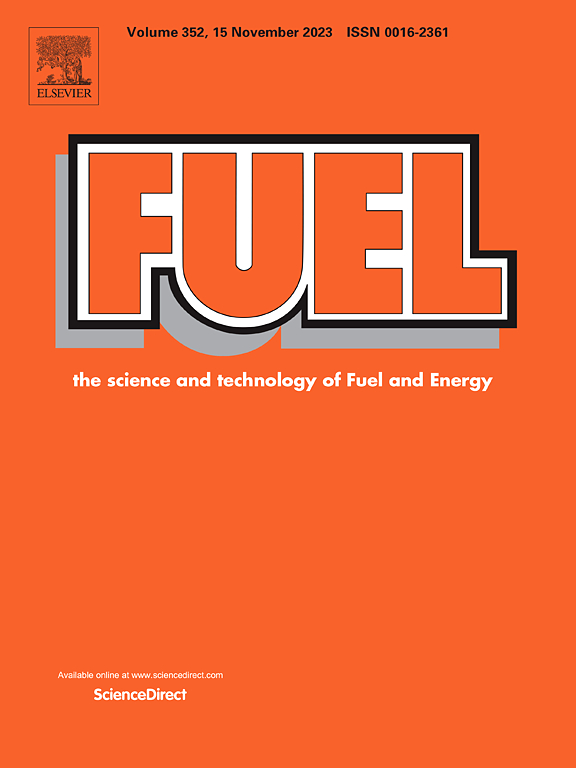LNG液化装置能耗综合评价及节能优化研究
IF 6.7
1区 工程技术
Q2 ENERGY & FUELS
引用次数: 0
摘要
小型液化天然气工厂在能源转换中发挥着至关重要的作用,但也遇到了一些挑战,如能耗水平不明确、运营成本上升以及环境影响等。尽管现有工厂积累了大量生产数据,但由于缺乏先进的分析工具,无法制定系统的能耗评估策略,从而限制了优化措施的有效性。本研究以设计产能为 1×106 Nm3/d 的 GY LNG 工厂为案例,结合 2020 年至 2022 年的实际运行数据,首次引入智能化综合评价方法,建立了由 37 个三级指标组成的能耗评价指标体系。通过现场实施,利用粗糙集理论和模糊隶属函数对能耗指标进行量化评估,确定各工艺系统的能效水平和优化方向。分析结果表明,工厂的单位能耗初始值为 0.6173 kW-h/kg,明显高于行业基准值。此外,还建立了工厂的稳态模拟数值模型,通过分析方法分析关键因素对能耗的影响,找出能耗的薄弱环节。研究采用遗传算法进行参数优化,显著降低了单位能耗,为类似的小型液化天然气工厂节能降耗提供了可行的途径和生产指导。优化结果表明,单位能耗降低了 9.51%,为 0.5586 kW-h/kg,每年可节约运营成本约 58 万美元,投资回收期为 1.6 年。这项研究系统地评估了液化天然气工厂的能耗,证明实施能耗优化措施不仅能降低运营成本,还能每年减少约 4,800 吨温室气体排放,从而促进小型液化天然气工厂的绿色转型。本文章由计算机程序翻译,如有差异,请以英文原文为准。

Comprehensive evaluation of energy consumption in LNG liquefaction plants and investigation of energy saving optimization
Small-scale LNG plants play a crucial role in energy conversion but encounter challenges such as unclear energy consumption levels, rising operating costs, and environmental impacts. Despite the accumulation of substantial production data in existing plants, the lack of sophisticated analysis tools hinders the development of a systematic energy consumption evaluation strategy, thereby limiting the effectiveness of optimization measures. Based on a case study of the GY LNG plant with a design capacity of 1 × 106 Nm3/d and actual operational data from 2020 to 2022, this study introduces an intelligent comprehensive evaluation method for the first time, establishing an energy consumption evaluation index system comprising 37 three-level indexes. Through field implementation, the energy consumption indexes are quantitatively assessed using rough set theory and fuzzy subordinate function to determine the energy efficiency level and optimization direction of each process system. The analysis reveals that the unit energy consumption of the plant was initially 0.6173 kW·h/kg, significantly higher than industry benchmarks. Furthermore, a steady-state simulation numerical model of the plant is developed to analyze the impact of key factors on energy consumption and identify energy consumption weaknesses through an analysis method. The study employs a genetic algorithm for parameter optimization, leading to a significant reduction in unit energy consumption and offering a viable pathway and production guidance for energy saving and consumption reduction in similar small-scale LNG plants. The optimization results demonstrate a 9.51 % reduction in unit energy consumption to 0.5586 kW·h/kg, translating to annual operational cost savings of approximately $580,000 with a payback period of 1.6 years. This research systematically evaluates the energy consumption of LNG plants and demonstrates that the implementation of energy consumption optimization measures not only reduces operating costs but also decreases greenhouse gas emissions by approximately 4,800 tonnes annually, thereby promoting the green transformation of small-scale LNG plants.
求助全文
通过发布文献求助,成功后即可免费获取论文全文。
去求助
来源期刊

Fuel
工程技术-工程:化工
CiteScore
12.80
自引率
20.30%
发文量
3506
审稿时长
64 days
期刊介绍:
The exploration of energy sources remains a critical matter of study. For the past nine decades, fuel has consistently held the forefront in primary research efforts within the field of energy science. This area of investigation encompasses a wide range of subjects, with a particular emphasis on emerging concerns like environmental factors and pollution.
 求助内容:
求助内容: 应助结果提醒方式:
应助结果提醒方式:


